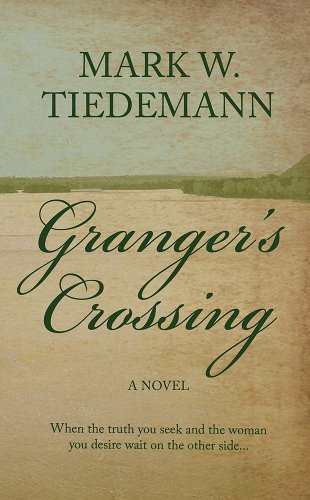Did I mention I have a new book? It launches in April, the 25th to be exact, and I’d like to tell you something about.
Granger’s Crossing is a departure for me. At least, at first glance. After decades of writing and publishing science fiction, I took a shot at historical fiction. In fact, this novel came directly out of another project, which was science fiction.
Quite some time ago I had an idea for an alternate history. I poked around for a good departure point and settled on the Louisiana Purchase. What if, I asked, it had never happened? What if Napoleon had never sold it to the United States? What if the continent had remained divided between France and the United States at the Mississippi?
After digging around I found what I considered a reasonable justification for this scenario and then went on to flesh out the novel, which took me in some fascinating directions.
One thing it gave me was more than a passing appreciation of early St. Louis history. After completing the first novel, I thought (quite arrogantly) hey, I could probably write a halfway decent historical novel.
On such unexamined assumptions surprising things are born.

This is NOT the alternate history. This one is the historical, though that doesn’t mean it is any less speculative.
One of the most under-attended periods of American history seems to be the Revolutionary War in the West. The eastern seaboard draws all our attention. That, after all, is where all the myth-making occurred—Philadelphia, Boston, New York, the Chesapeake, Baltimore. The prominent names are all there—Washington, Hamilton, Greene. The West seems less important, but the Mississippi River was important and the proximity of Spanish Territory played into strategic equations more than is taught in the average high school history class.Â
Even in my home I was surprised at how few people knew there had been a major battle.Â
Looking into it led me into a deeper exploration of that whole period of St. Louis history and the shape of a story began to coalesce.Â
I have never understood the general indifference toward history, particularly among people who otherwise love good stories. Pick up a volume of history and give it more than a little attention, and stories are everywhere.Â
In constructing the plot for Granger’s Crossing, I found a cast of characters almost begging for attention. I had no shortage of actual people living in St. Louis at the time to fill out the substance and flavor of the village.Â
At some point in the alchemical process of creating fiction, my hero, Ulysses Granger, took form. Step by step, I found cause for him to be there. I felt comfortable using a murder mystery template, at least to start the action, and once I found The Body, the plot began to take on a life of its own.
Given the circumstances—the Battle of St. Louis, known then as L’Annee du coup, in 1780—I had to establish a reason for my Continental soldier to either stay or return to St. Louis, which led to further research. The issues around the rivers at the time and the various interests involved, American, Spanish, French, British, provided the canvas on which to depict my characters, their motives, the challenges.Â
Somewhat to my surprise, the world of young Ulysses Granger took on the familiar attractions of the worlds I had explored in my science fiction. In that, I find historical fiction mirrored by science fiction. In a way, both are history and both require an attention to detail and an ability to imagine displacements from the present. Halfway into the writing, it felt familiar, at least in the sense of examining places and people wholly unfamiliar to me.
(One of the curious things I found is that of all the things one might expect the “Americans” to have brought to the region, the one thing they did provide was record-keeping. A lot of it, although most of it appears to be a byproduct of, essentially, title searches.)
This is exciting. This is one of the chief pleasures of fiction, the chance to see life through eyes other than our own. This is a culture we can only assume to be familiar, but really it is in many ways quite alien and in that quite exotic.Â
It took a few years to get this “right,” and by right I mean a satisfying narrative experience. Finding the beginning histories of my home town proved a delight and a pleasure. You can look at this place, where cultures met and intermingled in curious ways, and wonder how we came to be. As the population changed due to immigration and the long-distance decisions by powers not present on the ground, I found this period a kind of oasis in time, a singular setting for an evolving identity. Granger himself is very much an outsider, giving him a vantage point from which to see St. Louis as an observer. Though with Martine, the woman who takes center stage in his life, he is more intimately connected.Â
It will be interesting (to me and hopefully others) to see how Granger changes at time goes on. Yes, that means I have more stories about him to tell.
I am delighted that Blank Slate Press is publishing the novel. Their enthusiasm has been infectious. My thanks to them all.
The official release date in April 25th. There will be a bookstore event at Left Bank Books in St. Louis. Call them for details (314-367-6731) and please consider attending.
